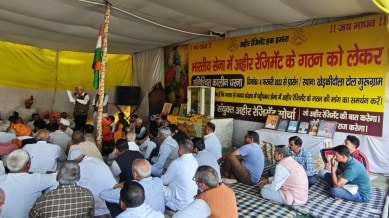Punjab and Haryana High Court disposes of Ahir plea against Farhan Akhtar starrer ‘120 Bahadur’
The petitioners accused ‘120 Bahadur’ of distorting historical facts and undermining the collective valour of 120 predominantly Ahir soldiers who fought to the last man against overwhelming Chinese forces.

In a swift courtroom resolution amid mounting pressure from the Ahir community, the Punjab and Haryana High Court Monday disposed of a Public Interest Litigation (PIL) challenging the certification and release of the upcoming Bollywood war drama 120 Bahadur, starring Farhan Akhtar.
Chief Justice Sheel Nagu, hearing the matter urgently, directed the Central Board of Film Certification (CBFC) and the Union Ministry of Information and Broadcasting to decide on the petitioners’ representation under Section 6 of the Cinematograph Act, 1952, within two days, by November 19, failing which the aggrieved parties would be at liberty to approach the court again.
The PIL was filed by the Sanyukt Ahir Regiment Morcha, a registered charitable trust that advocates for the recognition of Ahir soldiers’ contributions in the Indian Army, along with the descendants and family members of martyrs from the 1962 Battle of Rezang La.
The petitioners accused the film of distorting historical facts and undermining the collective valour of 120 predominantly Ahir soldiers who fought to the last man against overwhelming Chinese forces. They sought an interim stay on the film’s scheduled release on November 21, arguing that its portrayal as a “one-man heroism” tale centred on Major Shaitan Singh Bhati erases the regimental identity and sacrifices of the Ahir community.
The controversy stems from the Battle of Rezang La, fought on November 18, 1962, during the Sino-Indian War, a chapter etched in military lore as one of the most heroic last stands. Official records from the Ministry of Defence’s History of the Conflict with China, 1962, describe Charlie Company of the 13th Battalion, Kumaon Regiment (13 Kumaon), comprising 120 soldiers, 117 of whom were Ahirs from Haryana’s Rewari, Narnaul, Mahendragarh, and neighbouring districts, defending a vital mountain pass at 16,000 feet against sub-zero temperatures and a Chinese force outnumbering them 10-to-1.
Under the command of Major Shaitan Singh, posthumously awarded the Param Vir Chakra, the company held the Chushul sector, a linchpin for India’s supply lines to Ladakh. Despite inadequate winter clothing, artillery support, and ammunition, they inflicted over 1,300 casualties on the enemy before being overwhelmed.
Of the 120, 114 attained martyrdom, five survived grievously wounded, and one was taken prisoner. The Chinese reportedly covered the fallen Indian soldiers with blankets in respect, a gesture later commemorated in dispatches.
‘Irreversible injury’ to community honour
The petitioners, represented by advocates Manish Soni, Priyanka Soni, Gurdeep Grewal, and Ishita Negi, contended that 120 Bahadur, produced by Excel Entertainment and directed by Anand Acharya, fictionalises this collective saga into an individual officer’s narrative, renaming Major Shaitan Singh as “Major Shaitan Singh Bhati” (absent from official gallantry citations), and omitting references to the Ahir composition.
“By suppressing the collective nature of the battle and substituting the regiment’s historical composition, the respondents have violated the constitutional guarantees under Articles 14, 15(2), 21, and undermined the principles of constitutional morality, which require fidelity to truth and equality in remembrance,” said Advocate Manish Soni, invoking Supreme Court precedents like Maneka Gandhi vs Union of India (1978) and Union of India vs R Gandhi (2010).
They highlighted that the film’s trailer, released on June 6, 2025, and promotional materials in October, portrayed the protagonist as a lone warrior, converting a “collective saga of sacrifice” into “solitary heroism.” This, they argued, not only distorts public memory but also inflicts “irreversible injury” to community honour.
Pressing for immediate intervention, Advocate Soni said, “We’ve filed representation P7 at page 116, more than a week ago, on November 10, received by the Centre on November 13. No action yet,” the counsel urged, underlining prayers for quashing the certification, renaming the film to 120 Veer Ahir, including all 120 soldiers’ names, inserting a disclaimer, or declaring it a “work of fiction not based on true events.”
Chief Justice Nagu asked if they had exhausted their legal remedies. The Centre’s counsel clarified that Section 6(2)(A&B) mandates notice and opportunity for representation before action, while (C) allows revision without prior notice but is not automatic.
“Till now, we’ve not exercised that power,” the counsel admitted, adding that a retired brigadier-rank officer had been associated with the CBFC’s examination committee.
The Centre’s representative stated, “As far as the revision under Section 6 is concerned, we will decide it within two days.” This prompted the Chief Justice to intervene: “Keep it pending, let them decide it. They can place on record the order.”
Noting the “alleged public cause” and the film’s imminent release, Justice Nagu disposed of the petition “in view of the aforesaid assurance,” granting liberty to the petitioners to “revisit the court in case” of non-compliance.